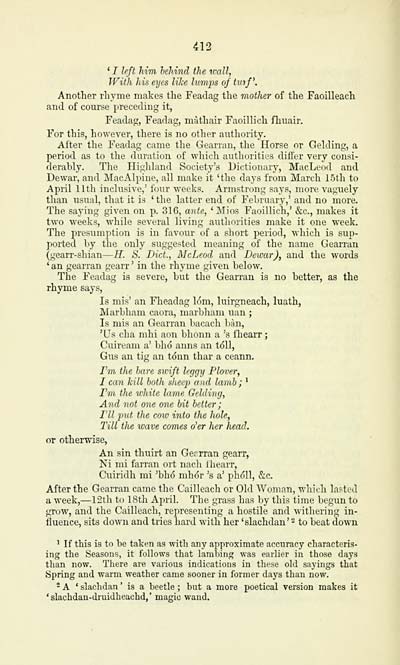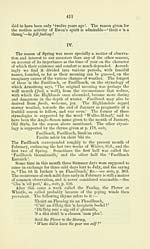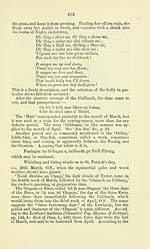Download files
Complete book:
Individual page:
Thumbnail gallery: Grid view | List view

412
'7 ìpft /im behind the icaU,
With his eyes Wee himps of tuif\
Another rhyme makes the Feadag the mother of the Faoilleach
and of course preceding it,
Feadag, Feadag, màthair Faoillich fhuair.
For this, however, there is no other authority.
After the Feadag came tlie (jearran, the Horse or Gekling, a
period as to the duration of which authorities differ very consi-
derably. The Highland Society's Dictionary, MacLeod and
Dewar, and MacAlpine, all make it 'the days from March 1.5th to
April 11th inclusive,' four weeks. Armstrong says, more vaguely
than usual, that it is ' the latter end of February,' and no more.
The saying given on p. 316, ante, 'Mios Faoillich,' &c., makes it
two weeks, while several living authorities make it one week.
The presumption is in favour of a short period, which is sup-
ported by the only suggested meaning of the name Gearran
(gearr-shian — H. S. Did., McLeod and Dewar), and the words
'an gearran gearr' in the rhyme given below.
The Feadag is severe, but the Gearran is no better, as the
rhyme says,
Is mis' an Fheadag 16m, luirgneach, luath,
Marbham caora, niarbham nan ;
Is mis an Gearran bacach liàn,
'Us cha mhi aon bhonn a 's fliearr ;
Cuiream a' bhd anns an toll,
Gus an tig an tonn thar a ceann,
I'm the bare swift leggy Plover,
I can kill both siieep and lamb; *
Fm the white lame Gelding,
And not one one bit better ;
ril fut the cow into the hole,
Till the wave comes o'er her head.
or otherwise.
An sin thuirt an Gerrran gearr,
Ni mi farran ort nacli Ihearr,
Cuiridh mi 'bho mhor 's a' pholl, &c.
After the Gearran came the Cailleach or Old Woman, which lasted
a week, — 12th to 18th April. The grass has by this time begun to
grow, and the Cailleach, representing a hostile and withering in-
fluence, sits down and tries hard with her 'slachdan' « to beat down
1 If this is to be taken as with any approximate accuracy characteris-
ing the Seasons, it follows that lambing was earlier iu those days
than now. There are various indications in these old sayings that
Spring and warm weather came sooner in former days than now.
* A ' slachdan ' is a beetle ; but a more poetical version makes it
'slachdau-druidheachd,' magic wand.
'7 ìpft /im behind the icaU,
With his eyes Wee himps of tuif\
Another rhyme makes the Feadag the mother of the Faoilleach
and of course preceding it,
Feadag, Feadag, màthair Faoillich fhuair.
For this, however, there is no other authority.
After the Feadag came tlie (jearran, the Horse or Gekling, a
period as to the duration of which authorities differ very consi-
derably. The Highland Society's Dictionary, MacLeod and
Dewar, and MacAlpine, all make it 'the days from March 1.5th to
April 11th inclusive,' four weeks. Armstrong says, more vaguely
than usual, that it is ' the latter end of February,' and no more.
The saying given on p. 316, ante, 'Mios Faoillich,' &c., makes it
two weeks, while several living authorities make it one week.
The presumption is in favour of a short period, which is sup-
ported by the only suggested meaning of the name Gearran
(gearr-shian — H. S. Did., McLeod and Dewar), and the words
'an gearran gearr' in the rhyme given below.
The Feadag is severe, but the Gearran is no better, as the
rhyme says,
Is mis' an Fheadag 16m, luirgneach, luath,
Marbham caora, niarbham nan ;
Is mis an Gearran bacach liàn,
'Us cha mhi aon bhonn a 's fliearr ;
Cuiream a' bhd anns an toll,
Gus an tig an tonn thar a ceann,
I'm the bare swift leggy Plover,
I can kill both siieep and lamb; *
Fm the white lame Gelding,
And not one one bit better ;
ril fut the cow into the hole,
Till the wave comes o'er her head.
or otherwise.
An sin thuirt an Gerrran gearr,
Ni mi farran ort nacli Ihearr,
Cuiridh mi 'bho mhor 's a' pholl, &c.
After the Gearran came the Cailleach or Old Woman, which lasted
a week, — 12th to 18th April. The grass has by this time begun to
grow, and the Cailleach, representing a hostile and withering in-
fluence, sits down and tries hard with her 'slachdan' « to beat down
1 If this is to be taken as with any approximate accuracy characteris-
ing the Seasons, it follows that lambing was earlier iu those days
than now. There are various indications in these old sayings that
Spring and warm weather came sooner in former days than now.
* A ' slachdan ' is a beetle ; but a more poetical version makes it
'slachdau-druidheachd,' magic wand.
Set display mode to: Large image | Transcription
Images and transcriptions on this page, including medium image downloads, may be used under the Creative Commons Attribution 4.0 International Licence unless otherwise stated. ![]()
| Early Gaelic Book Collections > J. F. Campbell Collection > Collection of Gaelic proverbs and familiar phrases > (456) |
|---|
| Permanent URL | https://digital.nls.uk/78593832 |
|---|
| Description | Volumes from a collection of 610 books rich in Highland folklore, Ossianic literature and other Celtic subjects. Many of the books annotated by John Francis Campbell of Islay, who assembled the collection. |
|---|
| Description | Selected items from five 'Special and Named Printed Collections'. Includes books in Gaelic and other Celtic languages, works about the Gaels, their languages, literature, culture and history. |
|---|

